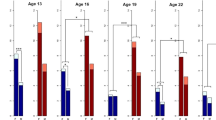Abstract
The purpose of this qualitative exploratory study was to (a) gain an increased understanding of how adult women with Turner syndrome (TS) have experienced the impact of this disorder on their personal development and maturation; and (b) identify other significant aspects of their maturation and development that emerge as crucial to their well-being. It employed a descriptive exploratory research approach wherein three women with TS were interviewed in an open, unstructured format to determine how TS had affected their lives. Analysis of transcribed interview data generated five themes: Relationships, Issues Related to TS, Coping Mechanisms, Maturation and Development, and Interpersonal Style. The first two themes are discussed and interpreted using adult development theory.
Similar content being viewed by others
REFERENCES
Abd, S., Turk, J., & Hill, P. (1995). Annotation: Psychological characteristics of Turner syndrome. Journal of Child Psychology & Psychiatry, 36, 1109–1125.
Barritt, L., Beekman, T., Bleeker, H., & Mulderij, K. (1983). A handbook for phenomenological research in education. Ann Arbor: School of Education, The University of Michigan.
Bogdan, R., & Biklen, S. (1992). Qualitative research for education: An introduction to theory and methods. Boston: Allyn and Bacon.
Branden, N. (1983). Honoring the self. New York: Bantam Books.
Bridges, W. (1980). Transitions: Strategies for coping with the difficult, painful, and confusing times in your life. Reading, MA: Addison-Wesley.
Brundage, D. (1988). The maturation process and learning in Proceedings of the Annual CASAE. Winnipeg, pp. 45–53.
Brundage, D., & MacKeracher, D. (1980). Adult learning principles and their application to program planning. Ontario Ministry of Education: Ontario Institute for Studies in Education Press.
Charney, S. (1987). The X's and O's of Turner's syndrome. Toronto: Turner's Syndrome Society of Canada.
Dey, I. (1993). Qualitative data analysis: A user-friendly guide for social scientists. London: Routledge.
Downey, J., Ehrhardt, A., Gruen, R., Bell, J., & Morishima, A. (1989). Psychopathology and social functioning in women with Turner syndrome. Journal of Nervous and Mental Disease, 177, 191–201.
Erikson, E. (1963). Childhood and society. New York: W. W. Norton.
Erikson, E. (1968). Identity: Youth and crisis. New York: W.W. Norton.
Ferber, G. (1995). An empathy supporting approach to the treatment of infertile women. Psychotherapy, 32, 437–442.
Gould, R. (1978). Transformations: Growth and change in adult life. New York: Simon & Schuster, Inc.
Gilligan, C. (1982). In a different voice: Psychological theory and women's development. Cambridge, MA: Harvard University Press.
Havighurst, R. (1974). Developmental tasks and education (3rd ed.). New York: David McKay.
Hinds, P., Chaves, D., & Cypress, S. (1992). Context as a source of meaning and understanding In J. Morse (Ed.), Qualitative health research (pp. 31–43). Newbury Park, CA: Sage.
Kegan, R. (1982). The evolving self: Problem and process in human development. Cambridge, MA: Harvard University Press.
Levinson, D. (1978). The seasons of a man's life. New York: Ballantine Books.
Lincoln, Y., & Guba, E. (1985). Naturalistic inquiry. Newbury Park, CA: Sage.
Lippe, B. (1982). Primary ovarian failure. In S. A. Kaplan (Ed.), Clinical pediatric and adolescent endocrinology (pp. 269–299). Philadelphia: W. B. Saunders.
LoBiondo-Wood, G., & Haber, J. (1990). Nursing research: Methods, critical appraisal, and utilization. St Louis: C. V. Mosby.
Marshall, C., & Rossman, G. (1989). Designing qualitative research. Newbury Park, CA: Sage.
McCauley, E., Ito, J., & Kay, T. (1986). Psychosocial functioning in girls with Turner's syndrome and short stature: Social skills, behavior problems, and self-concept. Journal of the American Academy of Child Psychiatry, 25, 105–112.
McCauley, E., Kay, T., Ito, J., & Treder, R. (1987). The Turner syndrome: Cognitive deficits, affective discrimination, and behavior problems. Child Development, 58, 464–473.
McCauley, E., Ross, J., & Sybert, V. (1994). Self-Concept and behavioral profiles in Turner syndrome. In B. Stabler & L. Underwood (Eds.), Growth, stature and adaptation (pp. 181–193). Chapel Hill: The University of North Carolina.
McCauley, E., Sybert, V., & Ehrhardt, A. (1986). Psychosocial adjustment of adult women with Turner syndrome. Clinical Genetics, 29, 284–290.
Mezirow, J. (1977). Perspective transformation. Studies in Adult Education, 9(2), 153–164.
Miles, M., & Huberman, M. (1994). Qualitative data analysis. Thousand Oaks, CA: Sage.
Miller, J. (1976). Toward a new psychology of women. Boston: Beacon Press.
Money, J., & Mittenthal, S. (1970). Lack of personality pathology in Turner's syndrome: Relation to cytogenetics, hormones and physique. Behavior Genetics, 1, 43–56.
Money, J. (1973). Turner's syndrome and parietal lobe functions. Cortex, 9, 385–393.
Moustakas, C. (1961). Loneliness. Englewood Cliffs, NJ: Prentice-Hall.
Neugarten, B. (1976). Adaptation and the life cycle. Counselling Psychologist, 1, 6–20.
Nielsen, J., Nyborg, H., & Dahl, G. (1977). Turner's syndrome: A psychiatric-psychological study of 45 women with Turner's syndrome. Acta Jutlandica, 45, 1–190.
Orten, J., & Orten, J. (1992, September). Achievement among women with Turner's syndrome. Families in Society, 73, 424–431.
Parse, R. (1995). Building knowledge through qualitative research: The road less travelled. Nursing Science Quarterly, 9(1), 10–16.
Pavlidis, K., McCauley, E., & Sybert, V. (1993). Psychosocial and sexual functioning in women with Turner syndrome. Clinical Genetics, 47, 85–89.
Pearson, L. (1992). The stigma of infertility. Nursing Times, 1(88), 36–38.
Robinson, A. (1990). Demography and prevalence of Turner syndrome. In G. Rosenfeld & M. M. Grumbach (Eds.), Turner syndrome (pp. 93–100). New York: Marcel Dekker.
Rovet, J. (1992, March/April). The psychoeducational characteristics of children with Turner syndrome. Contemporary Pediatrics, 3(2), 13–21.
Rovet, J. (1993). The psychoeducational characteristics of children with Turner syndrome. Journal of Learning Disabilities, 26, 333–341.
Salzer, L. (1991). Surviving infertility: A compassionate guide through the emotional crisis of infertility. New York: Harper Perennial.
Spencer, A. (1982). Seasons: Women's search for self through life stages. New York: Poulist Press.
Weiten, W. (1986). Psychology applied to modern life. Belmont, CA: Brooks/Cole.
Williams, J. (1992). School-aged children with Turner's syndrome. Journal of Pediatric Nursing, 7(1), 14–19.
Author information
Authors and Affiliations
Rights and permissions
About this article
Cite this article
Kagan-Krieger, S. Brief Report: Women with Turner Syndrome: A Maturational and Developmental Perspective. Journal of Adult Development 5, 125–135 (1998). https://doi.org/10.1023/A:1023043712377
Issue Date:
DOI: https://doi.org/10.1023/A:1023043712377




